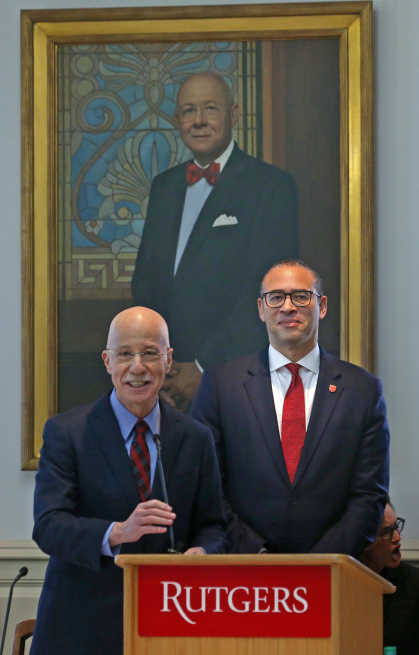Rutgers Board Chair Joins President Holloway’s Call to Action
Donates $1 million to Scarlet Promise Grants program

Rutgers University president Jonathan Holloway, pledging to lead by example, on his first day at Rutgers took a 10 percent pay cut, directed $125,000 in additional funding to the Scarlet Promise Grants program and made a personal donation of $75,000 to the program that provides funds to close the financial gap for Rutgers students.
Mark Angelson, chair of the Rutgers Board of Governors, heard Holloway’s call to action, donated $1 million to the Scarlet Promise Grants program and joined the new Rutgers president in launching a focused campaign to quickly raise $10 million for the program.
“These times of unprecedented struggle and uncertainty demand a public commitment by those of us who have benefitted from all that Rutgers has to offer,” Angelson said.
Angelson, who graduated from Rutgers College in 1972 and Rutgers Law School in Newark in 1975 and has a tradition of significant anonymous philanthropy to the university, made his $1 million contribution public to send an unmistakable message to Rutgers’ 70,000 students.
“I said ‘yes’ to President Holloway in this public way so that our students know that the board and the university leadership are standing with them as, together, we confront the economic, health and social challenges of the day,” he added.
“These are difficult and stressful times for our students. I think that those of us who have benefitted from a Rutgers education have an obligation to do what we can do to lessen the struggle,” Angelson said.
Scarlet Promise Grants offer essential financial support to talented students for whom a transformative Rutgers education would otherwise be impossible. Last year, the program distributed more than $33 million in assistance to 10,500 Rutgers students.
The grants help students like Sam Adepoju, a 2020 Rutgers-Camden graduate who credits the grants with allowing him to complete his Rutgers undergraduate degree. They provide need-based aid to Rutgers students as part of their financial aid packages and, in some cases, to relieve short-term, temporary financial hardship.
Funded through annual university budgeting and philanthropic resources, these grants help Rutgers fulfill its mission of education, research and service.


